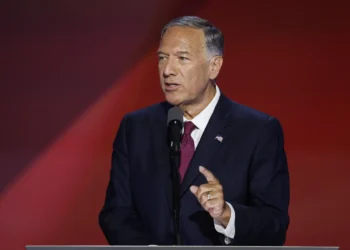WASHINGTON (Realist English). Rupert Murdoch and Donald Trump appeared in public unity last Sunday as they watched Chelsea’s Club World Cup win from the former president’s VIP box. But behind the scenes, their long and transactional alliance was rapidly unraveling.
Just hours later, Trump privately urged Murdoch to block the publication of a damaging story in the Wall Street Journal — a report detailing a letter allegedly written by Trump for Jeffrey Epstein’s 50th birthday album. The letter reportedly featured a crude drawing of a naked woman signed by Trump with the message: “May every day be another wonderful secret.”
Murdoch refused. On Thursday evening, the Journal, owned by News Corp, published the story. By Friday morning, Trump responded with fury — launching a lawsuit against Murdoch, Dow Jones, and News Corp. In a post on Truth Social, Trump threatened to “sue his ass off” and promised to force Murdoch to testify.
“We have full confidence in the rigor and accuracy of our reporting,” a Dow Jones spokesperson said, vowing to “vigorously defend” against the lawsuit.
Behind the scenes
The Journal had contacted Trump two days before publication. He denied authoring the letter or drawing the illustration and repeated his threat to sue. According to sources close to the matter, Trump and White House press secretary Karoline Leavitt made direct calls to WSJ editor Emma Tucker, Murdoch himself, and News Corp CEO Robert Thomson in an attempt to block the article. Trump later claimed Murdoch had assured him the piece would be “taken care of” — but admitted that “he obviously did not have the power to do so.”
Vice President J.D. Vance publicly dismissed the article as “complete and utter bullshit,” while MAGA figures like Tucker Carlson, Charlie Kirk, and Laura Loomer attacked the Journal but also criticized Trump for failing to be transparent about the Epstein case. Others, like Megyn Kelly, called the story “the dumbest attempted hit piece I’ve ever read.”
Strategic break or tactical distance?
People close to Murdoch suggest the 94-year-old media magnate is reassessing Trump’s hold over the conservative base. “He’s testing: is Trump losing the base on this?” said a former Murdoch executive. “Rupert thinks he’s still got time. He wants to outlive his mother — she lived past 100. Trump will come and go.”
Historically, Murdoch has had a complex relationship with Trump — useful but never affectionate. He withheld support during Trump’s 2016 rise, urged the GOP to back alternative candidates in 2024, and, after January 6, 2020, reportedly told Fox executives: “We want to make Trump a non-person.”
Still, Murdoch has often hedged his bets. Through his three main U.S. outlets — Fox News, the New York Post, and the Wall Street Journal — he maintains influence across different segments of the right. One former insider said: “It’s his M.O. — three ways to play a story, three audiences to serve.”
The WSJ editorial board has criticized Trump throughout his second term — opposing tariffs, vaccine policies, and immigration moves. Trump has fired back, calling the paper “the Globalist, and always wrong, Wall Street Journal,” and once described it as “China Loving” and “garbage.”
Legal war and media pressure
Trump’s suit follows a pattern: he previously forced settlements from CBS and ABC, each reportedly paying $16 million to resolve defamation claims. But insiders doubt Murdoch’s team will settle this case. “I can’t see them paying him off,” said the former Murdoch lieutenant. “I could see them firing some people. But not a payout.”
At the Journal, the story was met with approval. “It went through the roof,” one staffer said. “We got some new subscribers. Everybody seems pleased.”
While Trump remains highly popular — with 88% GOP approval according to CNN — his handling of the Epstein fallout is stirring unease within the right. His own attorney general, Pam Bondi, is now under fire from MAGA commentators for withholding documents related to Epstein.
For Murdoch, the Epstein leak may mark a turning point. “He sees himself as the custodian of American conservatism,” said media analyst Claire Enders. “But he won’t let Trump drag down his empire.”
What remains to be seen is whether this is a final break — or another chapter in one of the most strategic, uneasy alliances in modern political media.


















